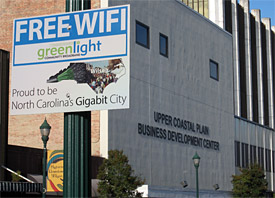This is the first in a series of posts examining a premier Gigabit Community - Wilson, North Carolina.
According to the U.S. Small Business Administration, 85% of all jobs originate from companies with fewer than 30 employees, and 87% of businesses which started through business incubators have succeeded after five years. So Wilson, North Carolina, focused its "Greenlight" gigabit beam on its local business incubator, the Upper Coastal Plan Business Development Center. "Greenlight is driven by three guiding principles," said Will Aycock, the network's General Manager. "Supporting the economic health of the community, improving the delivery of city services, and enhancing the quality of life for the citizens of Wilson." Providing access to symmetrical gigabit speeds has allowed the community's small business incubator to take its services to the next level, to give budding entrepreneurs access to the future today and in a uniquely affordable way.
According to Greg Goddard, Executive Director of the Upper Coastal Plain Council of Government, access to gigabit speeds has meant "Taking our incubation to the next level." Historically their business incubator has attracted "low tech" entrepreneurs: consultants, counselors, state associations, childcare and healthcare providers, people who need work space after normal office hours, even Chic Fil-A administrators, for employee training. The incubator provides a full suite of services including a receptionist, copy and fax machines, phones, 24 hour secure entry, kitchen, meeting rooms, training classes, access to experts, parking, and now, symmetrical gigabit speeds, all for an affordable price. "An 8' by 8' cubicle with those full-suite services leases at $275/month," he said. The goal is to stimulate budding internet-age businesses.

And it has, even for young entrepreneurs elsewhere in the state. For a tech entrepreneur like Dan Holt from Wake Forest, renting space at this Wilson-based incubator lets him be part of the future, and to experience the possible which is impossible at his home in Wake Forest only 30 miles away. Dan is a self-described techie for a local Raleigh defense subcontractor but he likes to be known as founder of the Wake Forest Fiber Optic Initiative.
 And it has, even for young entrepreneurs elsewhere in the state. For a tech entrepreneur like Dan Holt from Wake Forest, renting space at this Wilson-based incubator lets him be part of the future, and to experience the possible which is impossible at his home in Wake Forest only 30 miles away. Dan is a self-described techie for a local Raleigh defense subcontractor but he likes to be known as founder of the Wake Forest Fiber Optic Initiative.
And it has, even for young entrepreneurs elsewhere in the state. For a tech entrepreneur like Dan Holt from Wake Forest, renting space at this Wilson-based incubator lets him be part of the future, and to experience the possible which is impossible at his home in Wake Forest only 30 miles away. Dan is a self-described techie for a local Raleigh defense subcontractor but he likes to be known as founder of the Wake Forest Fiber Optic Initiative.




